Plastic Free July
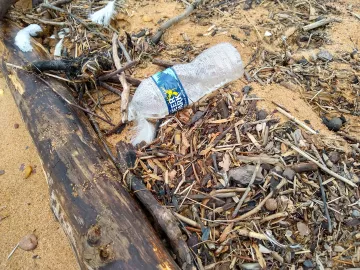
Plastic Free July is a global movement that encourages people to be part of the solution to plastic pollution! Commit to the challenge of reducing single-use plastic in your life so we have cleaner streets, oceans, air, and neighborhoods.
Do you forget reusable bags when shopping? Have you already switched to laundry strips and shampoo bars? No matter where you are on the plastic use spectrum, you can reduce your plastic waste further during July and beyond!
We can all think of ways to reduce plastics in our lives. What will you do?
Howard County Plastic Reduction Law
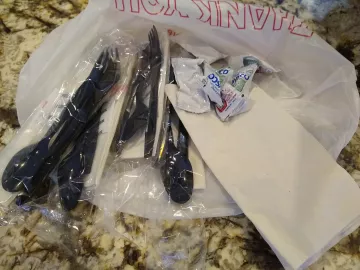
Howard County Bill No 13-2021 went into effect on January 1, 2022 to reduce the use of disposable plastic. The law encourages use of alternatives to plastic- ones that are marketed as reusable, paper, or compostable.
Certain plastic single-use:
- drinking straws,
- beverage stirrers,
- condiment packets, and
- food ware (plastic utensils, containers and lids)
can no longer be distributed where food is served to the public in Howard County unless requested by the consumer. Paper, home compostable, and reusable items are permitted. Plastic utensils, condiments, straws and stirrers should not be automatically included in delivery, pick-up, and online orders, but can be requested. Learn more about the Howard County Plastic Reduction Law.
The Zero Waste Team has created flyers in English, Mandarin, and Spanish to give a quick overview of the law, and to give residents who discover a restaurant not following the law an easy way to address the issue. Please consider distributing these flyers to restaurants that are not following the law to nudge them into doing the right thing!
Howard County Plastic Bag Fee
In 2020, Howard County rolled out a 5-cent fee on plastic carryout bags <2.25 mils thick to reduce the use of disposable plastic bags and the costs incurred with removing them from the environment.[1] In order to measure the impact of this policy, the Howard County Sierra Club Zero Waste Team and Less Plastic Please conducted observational surveys of shoppers’ bag use in grocery stores a year before (in 2019) and three years after (in 2023) the policy went into effect.
Figure 1: Distribution of shoppers at four Howard County grocery chains according to their choice of carryout bag, before and after the 5-cent plastic bag fee (% of shoppers)
| One year before the plastic carryout bag fee | Three years after the plastic carryout bag fee |
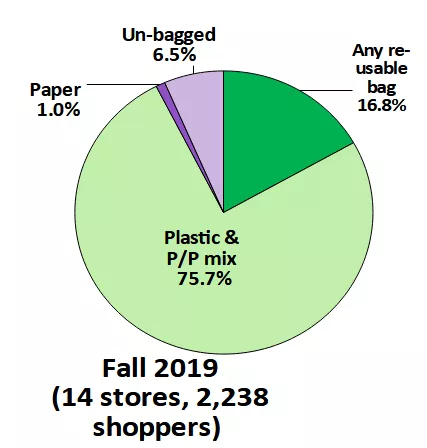
|
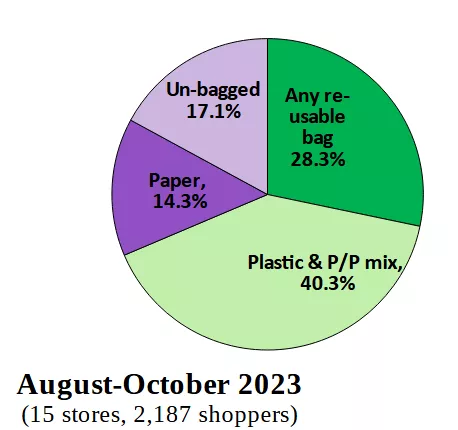
|
P/P mix= Plastic paper mix
Findings
- Progress has been made in curbing plastic bag use, but a portion of shoppers remain reliant on them.
- Many businesses are not following the rules for displaying the fee information.
- A few stores are now providing thicker film plastic carryout bags not subject to the fee.
- Nearly all of the grocery stores that provide thin plastic carryout bags at 5 cents each are also providing complimentary paper carryout bags at no charge.
- The plastic bag fee has resulted in an increase in the use of paper carryout bags, which, for all but Aldi and Lidl, are provided at no charge at checkout.
- Reusable bags (with stitched handles and not made of plastic film) were available at checkout at all of the retailers surveyed.
The Zero Waste team will use the complete survey results and the annual report the County produces to determine if we believe the fee is accomplishing its goals and what, if any, further action is required by our team.
[1] https://livegreenhoward.com/recycling-waste/plastic-bag-fee/
Say NO to more Synthetic Fields in Howard County!
Synthetic turf fields cannot be recycled, and their disposal causes numerous issues for the environment and living things.
The Howard County government recently announced that plans changed to install two natural turf multi-use fields instead of synthetic turf fields at the East Columbia Park, and we are delighted by this news. Thanks to all who called, wrote, and attended meetings!
We will be lobbying in the next few months for a commitment from the County to stop installations of new synthetic turf fields, and to only use safe playground flooring for new and updated playgrounds.
Background:
The County announced the purchase of the East Columbia Library Park in Owen Brown, adjacent to the East Columbia library, and plans to redevelop three existing multipurpose fields into two artificial turf baseball fields.
We oppose synthetic turf fields because:
- Plastic fields get dangerously hot. Athletes are increasingly impacted by heat related illness playing on synthetic surfaces.
- They are made from non-sustainable petroleum products.
- They contain multiple toxic chemicals.
- We now know, from the industry itself, that PFAS is present in every artificial turf ‘carpet’. Research indicates PFAS can cause decreased fertility and organ damage, impair vaccine response and cause cancers. They bioaccumulate in humans, and impact wild and aquatic life.
- They cause more injuries. Turf burns from friction, thermal burns, non-contact lower extremity injuries and concussions all occur more frequently on synthetic turf than on natural grass fields.
- Plastic fields sterilize living soil.
- At the end of their 8 to 10 years of life, they result in unrecyclable waste.
- Off gassing of methane and ethylene creates heat islands.
Sierra Club has a fact sheet on synthetic turf. Safe Healthy Playing Fields has a wealth of information on the facts and science of why grass fields are superior. Several environmental organizations sent a letter to County Executive Calvin Ball and Director Nick Mooneyhan outlining why we oppose installation of synthetic turf fields and advocate for well-maintained grass fields instead.
Howard County needs to protect children’s health and safety, and be a leader in combating climate change in all aspects of our lives!
One way to get closer to Zero Waste—repair it rather than trash it
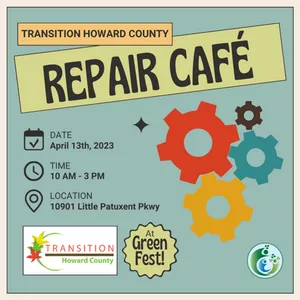
Do you have items in your house that need fixing or mending but you don't know how to fix them yourself?
Bring your broken items to the Transition Repair Café! Volunteers will evaluate and fix as many of them as they can and offer their expertise on items that are too large or not possible to bring in.
In 2024, Repair Cafés will be held on the second Saturday of each month from 3:00 - 5:00 pm, starting on April 13th and going through October 12th.
REGISTER FOR AN UPCOMING REPAIR CAFÉ
Learn more about the Community Ecology Institute's Maker Space here. Attend workshops, share tools, build community - visit their events page.
Resources
Documentaries
Learn more about the impact of plastic on our planet and on our lives. The group Community Documentary Night has created a great list of documentaries about plastic and its impact. And you can watch for free - watch one or all! Join the discussion about the harmful effects of plastic. Let's do something!
Zero Waste Bibliography
Howard County Library System has books available about zero waste. Also available on DVD is The Story of Plastic, summarizing threats to the environment and to health posed by plastic pollution.
Zero Waste Tips
- Reduce packaging by shopping in the bulk bin section
- Plan your meals and reduce food waste (and save money)
- Switch from liquid to bar soap
- Bring reusable bags when shopping
- Make your own cleaning products
- Instructions for making a T-shirt bag
- Check out this flyer on alternatives to trashing